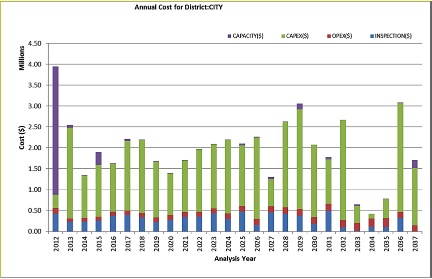Having the right tool for a job makes a fundamental difference to how easily and effectively that job can be done. When the job is managing an ageing water network – at a time when resources are constrained, but community expectation is high – the right tool is needed to factor in a sophisticated range of information, beyond the more traditional leading measure of age alone.
New Zealand’s water, wastewater and storm water networks represent a hugely significant asset, both in terms of their contribution to our health, economy and lifestyle, but also in terms of their price tag. The replacement cost of our local authority networks is estimated at $23 billion, with operating expenditure predicted to rise and capital expenditure estimated at $11.5 billion over the next 10 years.
Dunedin City Council’s water networks (which include some of the oldest in the country) have been used to develop and test a comprehensive real-life application of decision-making software dTIMS Pipeline, an extension of the dTIMS software first created (and now widely used) for predictive modelling of pavement deterioration.
dTIMS Pipeline is a flexible utilities deterioration tool that works with the council’s existing data collection systems to optimise timing and renewal cost predictions, with an eye on levels of service and risk considerations.
This allows for a fundamental shift in the time frames for thinking about strategic planning, which can be targeted at impending priorities or long-range forecasts of performance outcomes and investment planning over 50 or 100 years.
The tool is designed to optimise investment through a proactive rather than reactive approach – to minimise breaks and leakage, minimise risk, maximise capacity and effectively target and minimise operating and capital costs. The tool is also intended to link in with other asset management systems, creating more effective, accurate and meaningful systems overall.
A paper outlining the Dunedin implementation of the software won the award for best technical paper at the 2013 INGENIUM/IPWEA Conference in June.
Most importantly, as authorities face the realities of failing systems, dTIMS Pipelines will provide confidence through a tool that delivers realistic renewal and replacement profiles based on more than age alone.

The graph shows the future cost breakdown (uncalibrated) on the Dunedin City Council water reticulation network, with a relatively constant cost breakdown across the budget categories chosen for this network. The provisional forecasting results provide indications of sustainable budget levels to maintain the network in its current condition. This will also enable the Council to undertake meaningful scenario analysis of future Capex and Opex budgets with relative network condition as a key output.